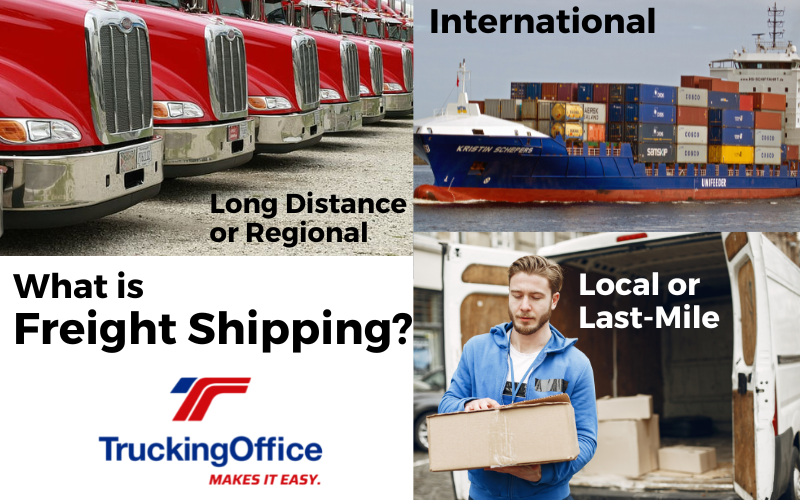What is freight shipping? Simply put, freight shipping is the movement of goods from one location to another by land, sea, or air. Trucking is a critical part of that transportation chain. Trucks handle the last-mile delivery as well as hauling loads from the factory to where they’re sold. Whether it’s thousands of pounds or a few hundred, it’s the trucker who gets the goods where they ultimately need to go. That’s why trucking software like TruckingOffice PRO is so valuable. It provides all the services an owner-operator trucking business needs.
Freight Shipping International
A lot of what we use here in the USA is manufactured outside of our country, so the goods coming in from overseas often come on ships. For a trucker to transport goods to or from a US port, they need special permits. Also, bringing goods across international boundaries like Canada or Mexico can have extra complications.
Long Distance Trucking Freight Shipping
Long-distance trucking is defined as trips over 250 miles. That’s just about 4 hours at 65 mph. Some truckers prefer to have a regional footprint and don’t go outside a specific area or distance. They consider the type of roads, the weight of the load, as well as the terrain before they accept the freight. Heavy loads that have to go through mountains might be turned down because of the cost of fuel or the wear and tear on the vehicle from the weight. The trucker would want a high price per mile to cover the costs and the potential for damage to the rig.
Regional Freight Companies
Shipping freight across the country isn’t for everyone. (But we are very grateful if you do it!) Some companies have a very defined range for their business. There are reasons for this.
- IFTA: By reducing the number of states a trucking company will travel in or through, they keep the IFTA simpler. If a trucking company is using TruckingOffice PRO with the TruckingOffice ELD, the IFTA filing is already simple. Using the data from the dispatch and routing when a load is entered into the software, the taxes report is available in seconds.
- IRP: The apportioned license plates that cover the road use for the states/jurisdictions are based on the very same numbers of miles per state that IFTA used. When a trucking company limits the region it covers, it does make the IRP simpler and quicker. TruckingOffice PRO takes the numbers again and produces an IRP report in seconds.
- Driver Recruitment and Retention: In the transportation industry, driver turnover has been extremely high for the past few years. Some drivers want to be close to home and spend their nights with family. By keeping a trucking company focused on a region, drivers know they’re likely to have short trips close to home.
Delivery or Last-Mile Freight
Often we think of delivery as an Amazon or FedEx driver making a residential delivery. But last-mile delivery is better described as freight shipping to the customer. Sometimes that customer is a retailer, not the end user. There are trucking companies that combine loads going into a hub or distribution center, and then use smaller trucks to take the freight out on delivery. This keeps long-distance truckers and their vehicles on the highways. With larger trailers that may not fit on city streets or trucks with cabs built for overnight trips, those long-distance truckers do better on the highways than the back alleys in some cities. The last mile is often the most expensive part of the shipping process because it takes more time to
- Drive through cities and their traffic
- Waiting for shipping dock crews to unload the freight
- Install the load (such as appliances or factory machines).
Frankly, if a freight shipping company is offering installation of the load, those truckers are going to be specialists who probably don’t want long trips on the road. If they’re paid per installation, they want their loads organized by location to get their work done quickly.
The cost of fuel for the last-mile delivery is also an issue. Diesel truck engines are designed for long-haul freight shipments, not for waiting at traffic lights to turn. Smaller trucks can get the job done, but they may be less fuel efficient, especially when considering idling time.
What Kind of Trucking Business Are You?
Freight shipping is not a simple field. There’s a lot of demand for truckers at every level of trucking. For an owner-operator, running a trucking business is a challenge regardless of the type. TruckingOffice PRO will help that owner-operator build and run a successful trucking business.







Recent Comments